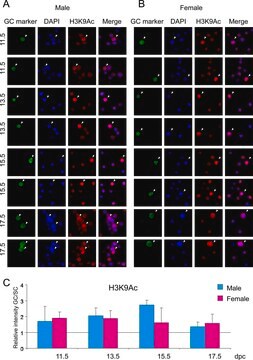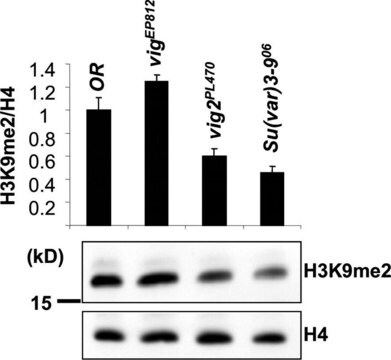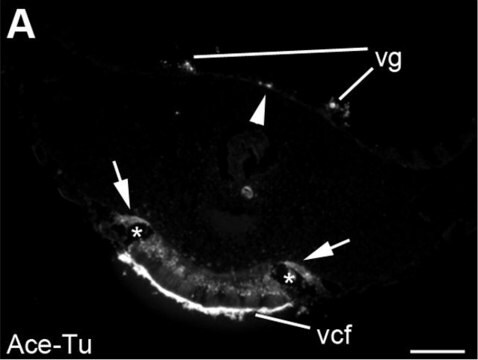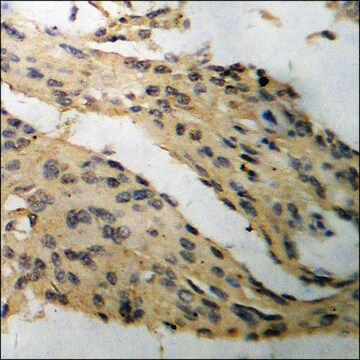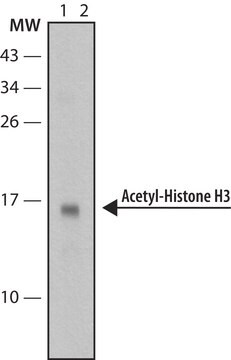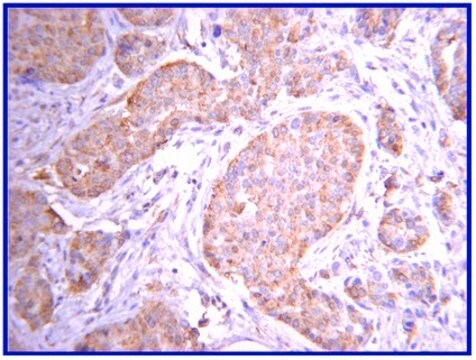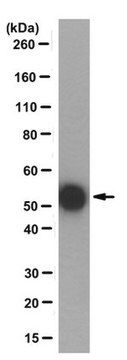04-119
Anti-acetyl-Histone H4 (Lys12) Antibody, rabbit monoclonal
culture supernatant, from rabbit
Sinónimos:
H4K12Ac, Histone H4 (acetyl K12)
About This Item
Productos recomendados
biological source
rabbit
Quality Level
antibody form
culture supernatant
antibody product type
primary antibodies
clone
monoclonal
species reactivity
human, vertebrates
manufacturer/tradename
Chemicon®
Upstate®
technique(s)
ChIP: suitable
dot blot: suitable
western blot: suitable
isotype
IgG
NCBI accession no.
UniProt accession no.
shipped in
wet ice
target post-translational modification
acetylation (Lys12)
Gene Information
human ... H4C1(8359)
Specificity
Immunogen
Application
Sonicated chromatin prepared from HeLa cells (1 X 10E6 cell equivalents per IP) were subjected to chromatin immunoprecipitation using either 2 µL of Negative Control Supernatant, or 2 µL of Anti-Acetyl-Histone H4 (Lys12) and the Magna ChIP A Kit (Cat. # 17-610).
Successful immunoprecipitation of Acetyl-Histone H4 (Lys12)-associated DNA fragments was verified by qPCR using ChIP Primers, human GAPDH Coding Region as a positive locus, and a gene desert region as a negative locus. (Figure 2). Data is presented as percent input of each IP sample relative to input chromatin for each amplicon and ChIP sample as indicated.
Please refer to the EZ-Magna ChIP A (Cat. # 17-408) or EZ-ChIP (Cat. # 17-371) protocol for experimental details.
Western Blot Analysis:
Lysates from HeLa cells untreated or sodium butyrate treated (Lanes 1 and 2 respectively) were resolved probed with anti-acetyl-Histone H4 (Lys12) (1:1,000). Arrow indicates Acetyl-Histone H4 (Lys12).
Arrow indicates Acetyl-Histone H4 (Lys12) (~11 kDa)
Epigenetics & Nuclear Function
Histones
Chromatin Biology
Quality
Target description
Physical form
Storage and Stability
Legal Information
Disclaimer
¿No encuentra el producto adecuado?
Pruebe nuestro Herramienta de selección de productos.
Storage Class
12 - Non Combustible Liquids
wgk_germany
WGK 1
flash_point_f
Not applicable
flash_point_c
Not applicable
Certificados de análisis (COA)
Busque Certificados de análisis (COA) introduciendo el número de lote del producto. Los números de lote se encuentran en la etiqueta del producto después de las palabras «Lot» o «Batch»
¿Ya tiene este producto?
Encuentre la documentación para los productos que ha comprado recientemente en la Biblioteca de documentos.
Nuestro equipo de científicos tiene experiencia en todas las áreas de investigación: Ciencias de la vida, Ciencia de los materiales, Síntesis química, Cromatografía, Analítica y muchas otras.
Póngase en contacto con el Servicio técnico
